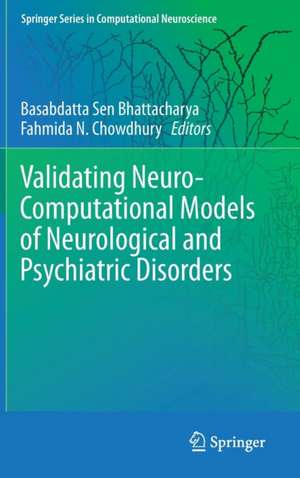Validating Neuro-Computational Models of Neurological and Psychiatric Disorders: Springer Series in Computational Neuroscience, cartea 14
Editat de Basabdatta Sen Bhattacharya, Fahmida N. Chowdhuryen Limba Engleză Hardback – 12 noi 2015
Validation is essential for neuro-inspired computational models to become useful tools in the understanding and treatment of disease conditions. Currently, the immense diversity in neuro-computational modelling approaches for investigating brain diseases has created the need for a structured and coordinated approach to benchmark and standardise validation methods and techniques in this field of research. This book serves as a step towards a systematic approach to validation of neuro-computational models used for studying brain diseases and should be useful for all neuro-computational modellers.
| Toate formatele și edițiile | Preț | Express |
|---|---|---|
| Paperback (1) | 642.36 lei 6-8 săpt. | |
| Springer International Publishing – 23 aug 2016 | 642.36 lei 6-8 săpt. | |
| Hardback (1) | 648.56 lei 6-8 săpt. | |
| Springer International Publishing – 12 noi 2015 | 648.56 lei 6-8 săpt. |
Din seria Springer Series in Computational Neuroscience
-
 Preț: 386.39 lei
Preț: 386.39 lei - 18%
 Preț: 954.62 lei
Preț: 954.62 lei - 24%
 Preț: 1173.18 lei
Preț: 1173.18 lei - 23%
 Preț: 1342.27 lei
Preț: 1342.27 lei - 18%
 Preț: 1124.78 lei
Preț: 1124.78 lei - 18%
 Preț: 957.13 lei
Preț: 957.13 lei - 5%
 Preț: 1424.89 lei
Preț: 1424.89 lei - 18%
 Preț: 1219.63 lei
Preț: 1219.63 lei - 18%
 Preț: 961.72 lei
Preț: 961.72 lei - 15%
 Preț: 650.04 lei
Preț: 650.04 lei - 18%
 Preț: 1379.21 lei
Preț: 1379.21 lei - 18%
 Preț: 951.77 lei
Preț: 951.77 lei - 18%
 Preț: 1217.75 lei
Preț: 1217.75 lei - 5%
 Preț: 1411.90 lei
Preț: 1411.90 lei - 18%
 Preț: 1228.29 lei
Preț: 1228.29 lei - 18%
 Preț: 1224.68 lei
Preț: 1224.68 lei - 18%
 Preț: 1224.85 lei
Preț: 1224.85 lei - 18%
 Preț: 949.73 lei
Preț: 949.73 lei
Preț: 648.56 lei
Preț vechi: 763.01 lei
-15% Nou
Puncte Express: 973
Preț estimativ în valută:
124.11€ • 132.71$ • 103.47£
124.11€ • 132.71$ • 103.47£
Carte tipărită la comandă
Livrare economică 18 aprilie-02 mai
Preluare comenzi: 021 569.72.76
Specificații
ISBN-13: 9783319200361
ISBN-10: 3319200364
Pagini: 315
Ilustrații: XVIII, 315 p.
Dimensiuni: 155 x 235 x 25 mm
Greutate: 0.64 kg
Ediția:1st ed. 2015
Editura: Springer International Publishing
Colecția Springer
Seria Springer Series in Computational Neuroscience
Locul publicării:Cham, Switzerland
ISBN-10: 3319200364
Pagini: 315
Ilustrații: XVIII, 315 p.
Dimensiuni: 155 x 235 x 25 mm
Greutate: 0.64 kg
Ediția:1st ed. 2015
Editura: Springer International Publishing
Colecția Springer
Seria Springer Series in Computational Neuroscience
Locul publicării:Cham, Switzerland
Public țintă
ResearchCuprins
Introduction.- Discovery and validation of biomarkers based on computational models of normal and pathological hippocampal rhythms.- DCM, Conductance based models and Clinical applications.- Computational Models of Closed-loop Deep Brain Stimulation.- A multiscale 'working brain' model.- How to render Neural Fields more realistic.- Multilevel computational modeling in epilepsy: classical studies and recent advances.- Computational modeling of neuronal dysfunction at molecular level reveals the role of single neurons in circuit functions in cerebellum granule layer.- Modeling Cortical and Thalamocortical Synaptic Loss and Compensation Mechanisms in Alzheimer's disease.- Toward Networks from Spikes.- Epileptogenic networks: applying network analysis techniques to human seizure activity.
Recenzii
“This interesting book is a step towards validation of the various neurocomputational models used for studying brain diseases. Written and edited by an array of internationally recognized experts in the field, it is an outstanding addition to neuroscience. … The target audience is primarily researchers doing neurocomputational modeling of various disease states as well as engineers, mathematicians, and theoretical neuroscientists interested in neurocomputation. … Each chapter ends with relevant and pertinent citations of the scientific literature.” (Michael Joel Schrift, Doody’s Book Reviews, April, 2016)
Notă biografică
Basabdatta Sen-Bhattacharya received her Bachelor's degree in Electrical Engineering from NIT Silchar (India), her Masters in Electronics and Telecommunication Engineering from Jadavpur University, Kolkata (India) and her PhD in Computer Science from University of Manchester (UK). She is a Fellow of the Higher Education Academy, UK and a Lecturer at the School of Engineering, University of Lincoln, UK. Before that, she worked as a post-doctoral researcher at the University of Ulster, UK and the University of Bordeaux, France. She has also served as a Manager at the Rourkela Steel Plant, Steel Authority of India Ltd. and as a Lecturer at the Department of Computer Engineering at the National Institute of Technology (NIT) Rourkela, India. Dr. Bhattacharya's research focuses on computational modelling of biologically-inspired neural networks to investigate anomalous brain signals in neurological disorders as well as inform smart bio-inspired technology.
Fahmida N Chowdhury is a Program Director at the US National Science Foundation ( NSF). She is involved with multi-disciplinary funding programs within the Social, Behavioral and Economic Sciences, and also across the Foundation. Before joining NSF in 2008, she was a Professor of Electrical and Computer Engineering at the University of Louisiana, Lafayette, USA. Prior to the University of Louisiana, she taught at Michigan Technological University, Southern University Baton Rouge and Bangladesh University of Engineering and Technology. Fahmida was born in Bangladesh, obtained her combined BSc/MSc (Honors) in Electromechanical Engineering from Moscow Power Engineering Institute in Russia (1981) and PhD in Electrical Engineering from Louisiana State University, Baton Rouge, Louisiana (1988). She has served as an Associate Editor for the IEEE Transactions on Neural Networks and also IEEE Transactions on Control Systems Technology; she was a Fulbright Fellow and a (summer) Visiting Professor at the Helsinki University of Technology, Finland. Her research interests include dynamic systems modeling, artificial neural networks, computational intelligence, detection of abnormal conditions in dynamic systems, modeling of socio-technical systems and issues in model validation.
Fahmida N Chowdhury is a Program Director at the US National Science Foundation ( NSF). She is involved with multi-disciplinary funding programs within the Social, Behavioral and Economic Sciences, and also across the Foundation. Before joining NSF in 2008, she was a Professor of Electrical and Computer Engineering at the University of Louisiana, Lafayette, USA. Prior to the University of Louisiana, she taught at Michigan Technological University, Southern University Baton Rouge and Bangladesh University of Engineering and Technology. Fahmida was born in Bangladesh, obtained her combined BSc/MSc (Honors) in Electromechanical Engineering from Moscow Power Engineering Institute in Russia (1981) and PhD in Electrical Engineering from Louisiana State University, Baton Rouge, Louisiana (1988). She has served as an Associate Editor for the IEEE Transactions on Neural Networks and also IEEE Transactions on Control Systems Technology; she was a Fulbright Fellow and a (summer) Visiting Professor at the Helsinki University of Technology, Finland. Her research interests include dynamic systems modeling, artificial neural networks, computational intelligence, detection of abnormal conditions in dynamic systems, modeling of socio-technical systems and issues in model validation.
Textul de pe ultima copertă
This book is a collection of articles by leading researchers working at the cutting edge of neuro-computational modelling of neurological and psychiatric disorders. Each article contains model validation techniques used in the context of the specific problem being studied.
Validation is essential for neuro-inspired computational models to become useful tools in the understanding and treatment of disease conditions. Currently, the immense diversity in neuro-computational modelling approaches for investigating brain diseases has created the need for a structured and coordinated approach to benchmark and standardise validation methods and techniques in this field of research. This book serves as a step towards a systematic approach to validation of neuro-computational models used for studying brain diseases, and should be useful for all neuro-computational modellers.
Validation is essential for neuro-inspired computational models to become useful tools in the understanding and treatment of disease conditions. Currently, the immense diversity in neuro-computational modelling approaches for investigating brain diseases has created the need for a structured and coordinated approach to benchmark and standardise validation methods and techniques in this field of research. This book serves as a step towards a systematic approach to validation of neuro-computational models used for studying brain diseases, and should be useful for all neuro-computational modellers.
Caracteristici
Covers the area of computational modelling and validation in neurological and psychiatric disorders Explores this non-invasive and inexpensive means of obtaining an objective perspective on brain circuit malfunction Of benefit to graduate students, researchers and academics in related fields Includes supplementary material: sn.pub/extras












